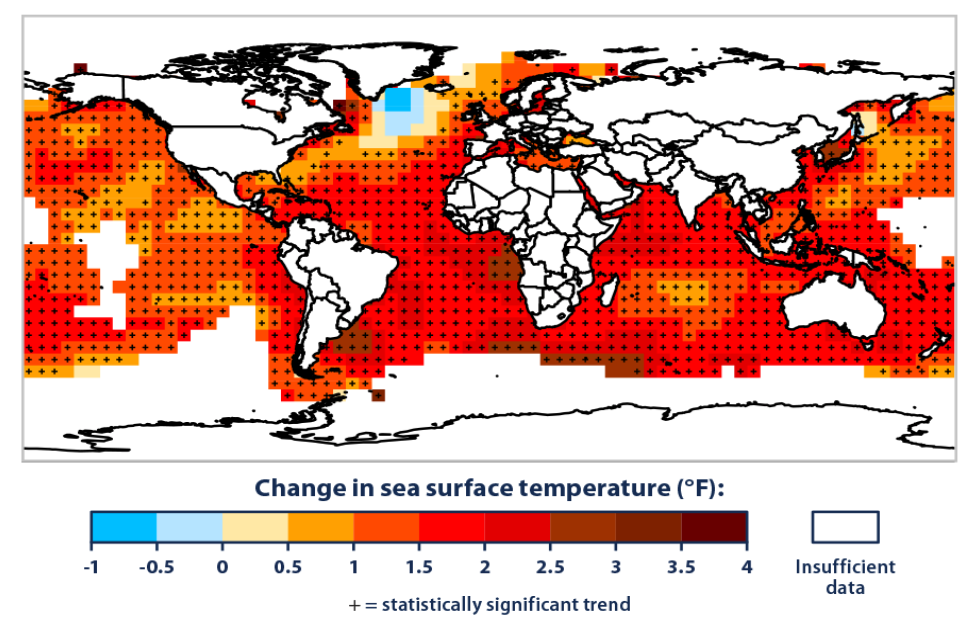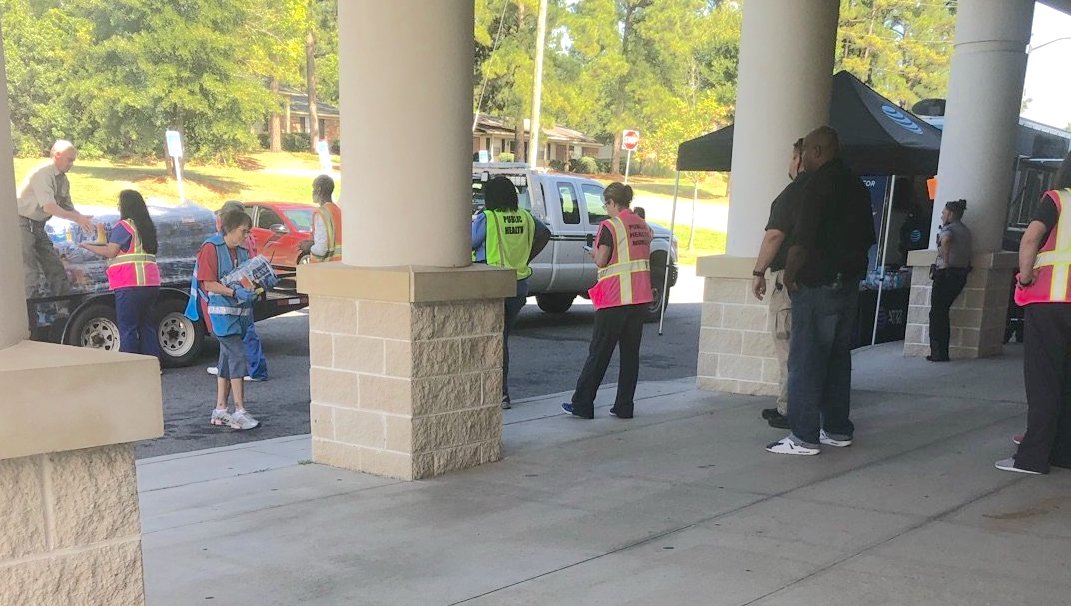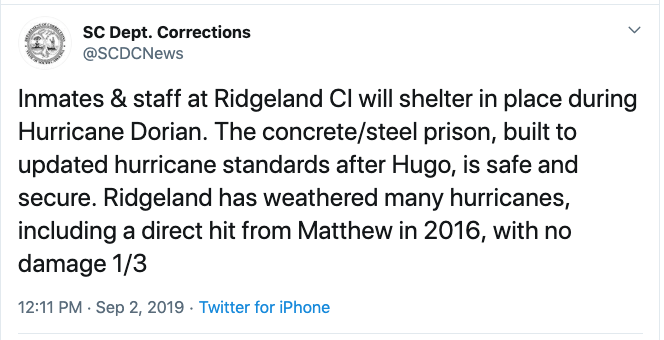Many hundreds of people are still missing and feared dead after Hurricane Dorian devastated large parts of the Bahamas. The storm leveled entire areas and cities of the island nation, then making its way north. Bahamian Prime Minister Hubert Minnis marked the storm as “one of the greatest national crises” to affect the country.
The National Hurricane Center rates hurricanes on a scale of one to five as a way to estimate potential property damage. Hurricane winds of Category 3 and above are of major concern, with devastating to catastrophic damage expected. Nevertheless, the NHC says that even Category 1 hurricanes produce “very dangerous winds” that could cause “extensive damage to power lines” and power outages lasting multiple days.
Climate change is intensifying hurricanes. The Union of Concerned Scientists notes that “warm ocean temperatures are one of the key factors that strengthen hurricane development.” And the oceans keep warming. This means that these storms will migrate more slowly with more rain, elongating the exposure to devastating winds.

As Hurricane Dorian approached the U.S., Georgia, Florida, and North and South Carolina declared states of emergency, and millions of people along the coastal cities were ordered to evacuate. But evacuation implies there is somewhere to go. People across the eastern coast are left to find a way to pay for the sudden expenses, or to risk perishing in the storm that left more than 206,000 in the U.S. without power.
The U.S. government manages 800 military bases on seven continents, but provides no help for the millions of people in harm’s way
When the U.S. government “orders” people in an area to vacate, it is simply that – an order. This is class warfare: this same government that manages logistics on seven continents for the largest military on earth, provides nothing to helpless people in the path of a deadly storm. Only a small number of people are even evacuated.
People are forced to find their own way to survive. During a time of crisis, businesses’ insatiable greed only increases. Days after the storm affected Florida, the state attorney general’s office received more than 2,400 notices of price gouging. One woman told the Fort Myers News-Press how the La Quinta hotel inflated the cost once she arrived. The manager told her this was “automatic because of the hurricane.”
Capitalism means that supplies are not distributed according to need, but according to who can pay for it. Workers who are able to evacuate must have the means to do so, and the money to be able to pay for such sudden expenses. But most people are not able to make ends meet, even without a hurricane. A 2017 Bankrate survey found that 57 percent of people are not able to cover a $500 unexpected expense. People who cannot afford evacuation do not get to safety. Gasoline is not free. Bottled water from the store costs money.
Liberation News spoke with Tripp, who evacuated Savannah on September 1 after the evacuation order was given, to Augusta to stay with family. “Honestly, I don’t feel like my experience is very reflective of what most people went through in Savannah. Because I was lucky to be able to leave.
“My father, for example, had to stay behind, not because he wanted to, but because he had nowhere to go and couldn’t afford a place to stay, or gas to leave. I feel privileged honestly. I am thinking about the people at the shelters here. One woman I spoke with didn’t have any family to help.”
Crises make clear the distinction between workers’ lives and profits. Capitalism is a system based on the exploitation of the vast majority of the population for the benefit of a tiny few. The rich hoard life-saving supplies and resources, and then escape disaster-struck areas on their private planes.
‘Who can afford that? Only a rich person can.’

When shelters are set up, they are coordinated through corporate entities like the Red Cross and the religious Salvation Army. Liberation News travelled to Augusta, Georgia and spoke with representatives from the Red Cross. They explained that the counties of Chatham and Augusta negotiated a deal to establish four shelters for evacuees. Transportation via bus was provided by the Red Cross, and paid for by the counties. More than 1,200 people were bused to Augusta, while another 200 people arrived in their own cars.
Savannah in Chatham County was one of the cities ordered to evacuate. Its metropolitan area has a population of 389,494, meaning that only 0.3 percent of people went to the established shelters. There is no official count of how many people leave, and people often have to rely on informal networks to get out.
Liberation News spoke with a woman sitting outside in front of the shelter. She lamented the compound expenses that result from the hurricane aftermath. Cars that are left behind get flooded and require buying a new engine, which easily can cost $800. “Who can afford that? Only a rich person can.”
South Carolina collectively punishes and terrorizes prisoners
Prisoners and undocumented workers are treated with even more cruelty during times of crisis. Despite the mandatory evacuation order for 830,000 people in South Carolina, the state (once again) refused to evacuate prisoners from the hurricane’s path. The group Fighting Toxic Prisons has organized “phone zaps” to the prisons have been taking place, demanding the prisons be evacuated.

Last year the state also refused to evacuate 3 prisons, until mounting public pressure, including a campaign led by members of the Party for Socialism and Liberation, forced the state to relent and evacuate one of the prisons. Prisons are not immune to flooding. During Hurricane Harvey in Texas, cells were flooded and water and toilets did not function. In New York, Hurricane Sandy flooded a Manhattan prison up to the third floor of the building.
Prisoners in South Carolina were placed in lockdown and denied the ability to store water in buckets or bottles. Prison guards called these “contraband.” Liberation News has previously reported on South Carolina’s inhumane and cruel treatment of prisoners, including blocking sunlight from reaching the cells, and denying prisoners access to fruit. Last year, South Carolina allowed seven people to be stabbed and die at Lee Prison. This was the worst incident of preventable deaths in a quarter century. Refusing to evacuate prisoners is yet another strategy of collective punishment.
ICE terror intensifies during crises
Undocumented workers are faced with an impossible decision: evacuate, and risk arrest by the immigrant police ICE; or attempt to ride out the storm and risk death. In fact, the attacks on immigrants intensify during crises: the U.S. government cut $10 million from FEMA’s budget last year and transferred that money to fund immigrant concentration camps. As tens of thousands of people fled the path of Hurricane Harvey, ICE set up checkpoints to detain and deport immigrants, intensifying the terror for working families desperate for safety.
ICE denied that they would raid shelters looking for immigrants, but this statement comes from an agency that exists to terrorize immigrants in every way possible. ICE established a fake university to lure immigrant youth into revealing their information. ICE agents ambush immigrants as they leave court, during work, at their schools, and during all parts of the day.
Climate crises and class society
Climate change makes stark the reality of class society: a tiny few live in unspeakable luxury by exploiting the vast majority of humanity. The rich will escape the consequences of climate catastrophe and move on to one of their many mansions around the world. Before Dorian landed, actor Sofia Vergara posted photos of herself and her family partying as the storm loomed, and then finally taking off in her private jet with the glib caption, “Bye bye Dorian!!”

In Los Angeles during the 2018 fires, wealthy celebrities hired private firefighters to protect their multi-million dollar mansions while millions of people faced suffocating smoke and life-threatening fires.
These posts offer a glimpse of how the capitalist class exists divorced from the reality of working people, but not the complete picture. Vergara has a net worth of $180 million. She has access to a private jet, and owns multiple homes around the world. By contrast, Mark Zuckerberg’s net worth is estimated at $8,200 million, and Jeff Bezos’ controls $170,000 million. Their private lives (and any escapes from climate change) are simply invisible. Most people in the U.S., on the other hand, live paycheck-to-paycheck, meaning they have no net worth at all.
When natural disasters strike, the capitalist class shields themselves from its consequences. The economic system that enriched them through human exploitation enriches them further in times of crisis, as desperate working people are forced to buy more to survive. As long as resources are dominated by the capitalist class, this trend will continue.
Socialist internationalism: the only way forward
Contrast the actions of the U.S. ruling elite with those of revolutionary Cuba. Two days after the storm battered the Bahamian islands, the more than 60 teachers, doctors and other medical professionals already in the Bahamas affirmed their commitment to helping rebuild the country’s medical and educational services.
The Cuban professionals were already working in the Bahamas as part of long-standing international cooperation between the two island nations. According to Granma, Cuba’s teaching brigade is the oldest of its kind in the Bahamas. Many Bahamian youths from high school to university learn a variety of disciplines from Cuban teachers. Cuban medical workers provide critical support for Bahama’s healthcare sector, and have ensured that public hospitals can stay open for longer.
Ismara Vargas, Cuban ambassador to the Bahamas affirmed international ties and cooperation. “As is always the case with Cuban cooperation in other parts of the world, in the face of these disasters, everyone contributes to the recovery efforts.”
At the same moment that Cuba extends resources to save human lives, the U.S. government earmarked millions of dollars towards a USAID program to discredit and slander Cuban cooperation.
The climate is changing: oceans are warming; polar ice is melting; and the seas are rising. These storms will only exacerbate their effects on the people of the world, most of whom live in coastal areas. Rational planning for human needs, and international cooperation is an urgent necessity. The socialist reorganization of society is possible, but only through the struggle of a united working class.





